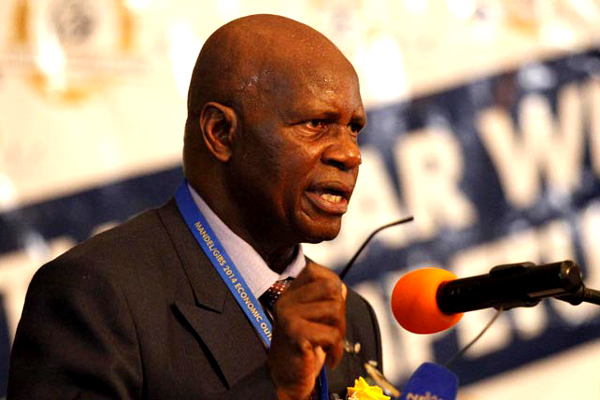
FINANCE minister Patrick Chinamasa will today present his 2017 National Budget, which is unlikely to be above $4 billion due to a shrinking tax base.
BY VICTORIA MTOMBA

Since dollarisation, the country has not had a budget above $4,5 billion, as revenues continue to dwindle.
Civil servants’ salaries and wages continue to chew the biggest chunk of the budget, gobbling 97% of revenue in the first half of the year.
The civil servants’ numbers increased between February 2009 and December 2014, from 203 362 to 276 123 despite a recruitment freeze. This has left the country with nothing to finance capital projects and social services that have been neglected.
The issue of the huge civil servants’ wage bill remains an elephant in the room because the government does not have a common position on the matter.
In his mid-term presentation in September, Chinamasa came up with staff rationalisation measures for the civil service, which were immediately shot down by President Robert Mugabe.
Economist, Prosper Chitambara said civil service rationalisation was not easy to implement, particularly in the run up to the 2018 elections.
- Chamisa under fire over US$120K donation
- Mavhunga puts DeMbare into Chibuku quarterfinals
- Pension funds bet on Cabora Bassa oilfields
- Councils defy govt fire tender directive
Keep Reading
“Government will be trying to appease the civil servants, so the rationalisation might not happen now. As for the bonus, the civil servants might not get it this year, since they have promised them residential stands,” he said.
Chitambara said Chinamasa could not do much, as the economy has weakened, resulting in dwindling revenues.
“There is need for strong fiscal incentives to promote formalisation of the informal sector. The informal sector determines how government will get resources domestically,” he said.
Chitambara, however, said some progress has been made on the re-engagement process, although no fresh capital would be injected into the economy.
“A bit of progress has been made, we cleared our arrears with IMF [International Monetary Fund] and we have the Interim Poverty Reduction Paper, although there are no resources to implement it. Unfortunately, there is no fresh capital, unless we address the full payment of arrears to other international financial institutions,” he said.
Economist, John Robertson said there was need to put back land on the marketplace so that those who want it will have to pay for it.
“Currently, land cannot be used to borrow from the bank. When you disable the land, you disable the industry,” he said.
Government is yet to finalise 99-year leases so that they are bankable and farmers can use them as security to get loans from financial institutions.
The presentation comes as central bank governor, John Mangudya has introduced bond notes, to be used concurrently with the United States dollar.
The growth rates for 2016 were revised downwards to 1,2% from the 2,7% initially projected due to a poor agricultural season.
The 2016 budget was $4 billion.
Analysts say the government has to quicken the reforms of public enterprises that have been draining the fiscus.











